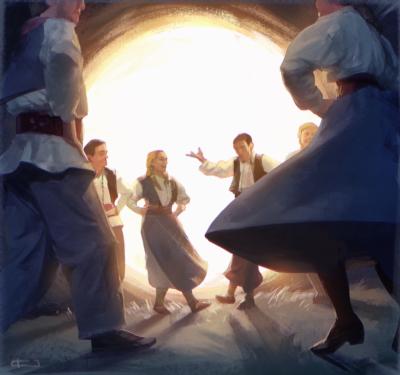Partisan Circle Dances (part 3)

When they discuss circle dances, historical sources of the Yugoslav partisan war most often mention the Kozara circle dance. Equally as often, they emphasize rhyming folk couplets on war and political topics as the music that accompanied the circle dances (as explained in part 1). It is important to mention, however, that there were many variations of the circle dance, and that the topics for the couplets that were popular in peacetime remained so during the wartime too, especially in more relaxed or unsupervised settings.
The best example is provided by Eva Grlić, who spent most of her partisan life in Slavonia (eastern Croatia). One evening, with the intention of cheering her up, a friend took her for a walk through the forest to a clearing where a group of young people were dancing, illuminated only by the moon. “There was something magical in that scene of dance in the moonlight. […] To me it seemed like a pure surrealism,” Grlić noted in her memoir. Young women and men danced the taraban circle dance and sang:
It is easy to dance taraban
Jump up, and on your own you will go down.
and
Girls, come to me
Before the women have caught me.
This short fragment from Eva Grlić’s memories of war hints at a relevant aspect of life in the partisan army: although the partisan military authorities prohibited romantic relationships among partisans, particularly what we today call hooking up, they never succeeded in eradicating it. If nothing else, many covertly whispered about love, sex, relationships, and marriage, talked and even sang about it. A series of rhyming couplets with which the mischievous participants expressed their thoughts on the restrictive partisan policy remained:
Leave love alone, my sweetheart
And go fight for people’s right.
When our country is free again
Return and make love then.
-----
When I remember your face, my dear
I forget about my commander.
-----
The girls are begging you, comrade Tito,
Let the boys go.
For two, three days or five, six hours at least
And then return them to the brigade forthwith.
Translation of the couplets: my own.
Author of the illustration: Dario Jelušić.
Bibliography:
Bošković-Stulli, Maja. Petokraka, zašto si crvena: narodne pjesme iz ustanka (Five-pointed Star, Why Are You Red: Folk Poems of the Uprising). Zagreb: Lykos, 1959.
Grlić, Eva. Sjećanja (Memories). Durieux: Zagreb, 1997.
Rihtman-Auguštin, Dunja. “Folklor kao komunikacija u NOB” (“Folklore as Communication during the NOB”). In Kultura i umjetnost u NOB-u i socijalističkoj revoluciji u Hrvatskoj (Culture and Art in the NOB and Socialist Revolution in Croatia), edited by Ivan Jelić, Dunja Rihtman-Auguštin, Vice Zaninović, 151–166. Zagreb: Institut za historiju radničkog pokreta Hrvatske, 1975.
